Many remain unaware of health risks from natural toxins in food, posing unrecognized dangers.

Natural toxins in food
Go to source). Beans and potatoes, for instance, contain such substances, posing potential health risks. Surprisingly, a recent survey by the German Federal Institute for Risk Assessment (BfR) found that only about half of respondents (47%) were aware of these plant toxins.
‘Only 47% know of plant toxins, while 63% worry about pesticide residues. Education needed! #foodsafety #healthrisks #medindia’





The survey also highlighted that while 27% are worried about this risk, a larger proportion, 63%, are concerned about residues from plant protection products, and 62% are troubled by contaminants like heavy metals that unintentionally end up in food."The survey results make it clear that risks of natural origin tend to be underestimated, while risks of synthetic origin tend to be overestimated," says BfR President Professor Andreas Hensel."
Awareness and Concerns about Plant Toxins in Food
Raw plant-based foods are consumed frequently by 34 percent, occasionally or rarely by 45 percent and very rarely or not at all by 19 percent.Which foods with naturally occurring plant toxins do you already know? If this question is asked openly and without pre-selection, potatoes are named first (15 percent), followed by tomatoes, raw beans (nine percent each) and mushrooms (five percent).
Naturally occurring toxic substances worry 27 percent in the survey. More than half of the respondents (53 percent) feel poorly informed about plant toxins in food, while only eight percent feel well informed.
Advertisement
Residues are residual amounts of substances that are used in the production of food. For example, residues can remain in fruit, vegetables or cereals even if plant protection products are used correctly.
Advertisement
Understanding Contaminants in Food
Contaminants, on the other hand, are undesirable substances that unintentionally end up in food. They can occur naturally in the environment, arise during the processing of raw materials into food or be released into the environment as a result of human activities. Contaminants are undesirable because they can be harmful to health under certain circumstances.The study also shed light on the related topic of "mouldy food". Here, too, there is a clear need for education. Even small amounts of mould toxins can be harmful to the health of humans and animals. Mouldy jam, for example, should therefore always be disposed of completely. Nevertheless, 25 percent of respondents stated that they only remove the mouldy part. Even in the case of mouldy berries, affected and surrounding fruit should no longer be eaten. Only 60 percent adhere to this rule.
Reference:
- Natural toxins in food - (https://www.who.int/news-room/fact-sheets/detail/natural-toxins-in-food)
Source-Medindia















